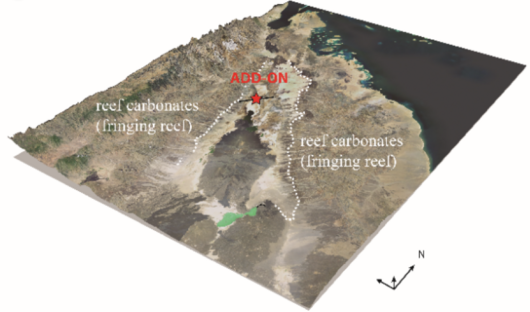Afar Dallol Drilling - ONset Of Sedimentary Processes In An Active Rift Basin
Project Acronym: ADD-ON | State: Workshop Held
Since the early days of the continental drift theory, the Afar triangle developed into an ideal field laboratory where the onset of continental and potentially future oceanic rifting can be studied in detail. The Danakil Depression is the northern portion of the Afar triangle, bordered to the west by the Nubian Plateau and to the East by the Danakil Horst, and characterized by active rifting since Oligocene times.
The overarching scientific goal is to get insights into the detailed sedimentary facies evolution in an active rift setting paced by global environmental fluctuations and their interplay with volcano-tectonic events. Seismo-stratigraphic interpretations based on industrial seismic sections, core and borehole data evidence the presence of Pleistocene evaporite units until the depth of about 900 m below the Dallol salt pan (central Danakal Depression, northern Afar). However, to date not any sub-salt sedimentary core records are available from the central part of the rift basin filled with more than 5 km of sediments. Having future access to targeted drilling sites in the Danakil basin will give new insights into:
- The mechanical understanding of intermittent and incipient basin dynamics in an initial extensive continental rift basin: from rifting towards the development of passive margins,
- East African climatic changes and Hominin evolution,
- The limits of the deep biosphere in extreme hypersaline and high-temperature environments below the salt deposits,
- Natural fluid flow in an active geothermal system and
- Monitoring of active faults, earthquakes and volcanic events in remote areas.
Keywords: Africa, Ethiopia, Basin Dynamics, Deep Biosphere, Paleoclimate, Paleoenvironment, Passive Margins, Rifting, Seismicity
External website: https://www.afardalloldrilling.com

Project Management
Project Details
Project Location
Project Timeline
First Full Proposal Submitted
ICDP Workshop
28 - 31 August 2023 in Addis Abeba, Ethiopia
Online Workshop Held
23 - 30 June 2021, online

